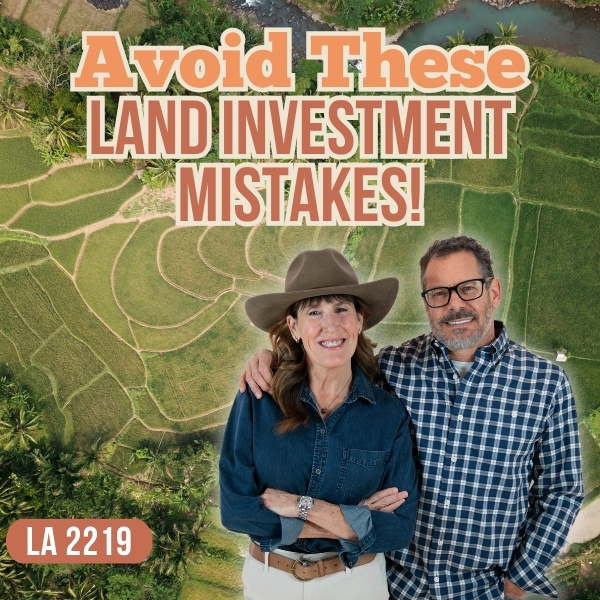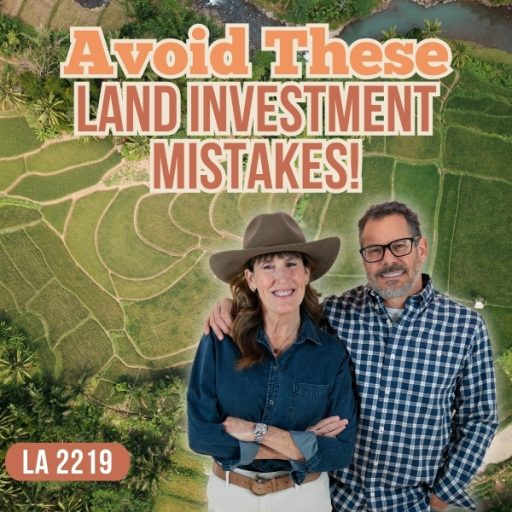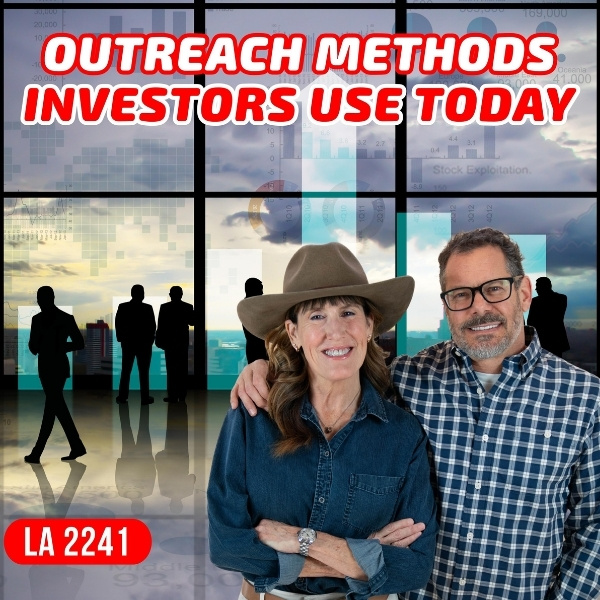This is episode number 2219. Jill and I are talking about the top five land investment mistakes and how to avoid them. We have personally experienced them.
That’s a good question. How many mistakes have we made in many years of doing this?
I don’t know if I’ve made that many land mistakes, but I’ve made a lot of mistakes in every other area of my life.
Like in relationships?
Yes, for sure.
In land, we are good at it. In relationships, we are not. In raising kids, we are probably not that great. In personal acquisitions, like cars, we are probably not great there.
I full-blown failed at selling land on terms. This was many years ago.
Did you, or was it just not the right environment? There are times to do it and times not to do it.
What happened is I hated it. It didn’t work. It ended up being a collection agency. I changed my business model, and here we are. Was that a failure? I don’t know.
It wasn’t a failure. I see that as a win. You figured out what you were capable of. You pivoted to something way more profitable anyway. It all worked out.
Jill and I, all five days, are going to talk about your requested topics, stuff that is out on the internet and intrigues people about this business, and all the details that surround that. We’re talking about the top five land investment mistakes and how to avoid them. In the next episode, we are talking about the 24-Month Millionaire Land Investor Program Deconstructed. I created this a lot of years ago, and it was a smash hit then. I’m bringing it back with many years of experience.
Next, we’re talking about the worst states to select for land investment. Then, we’re talking about what to expect as a brand-new land investor. Finally, we’re talking about why land investment is the most efficient way to quit your job. Here’s a hint on that. It’s so cheap to get into. Each day on the show, we answer a question from our Land Academy member Discord forum. We take a deep dive into land-related topics at your request.
Ram wrote, “I’ve received several leads from a pay-per-click campaign that includes lots in undeveloped subdivisions. I usually pass on these, but I’m curious as to why these lots exist at all. In many cases, the lots were purchased 20 to 30 years ago, but it seems the subdivision was never built. Is it just that they bought the land expecting to build out there someday, and it never happened? In most cases, there still isn’t any infrastructure at all, just paper streets on a map. Any insights? Is there any opportunity with these lots?”
The Phenomenon Of “Paper Subdivisions”
I have a lot of experience with this type of asset. There are a lot of different names for them. Some are positive, and some are negative. During the ’50s and ’60s in this country, specifically in places where people would travel during the summer or in the off-season, whatever version of that is, people would go out, usually from Southern California, because there was a real estate boom there. They would go into a couple of different states, specifically.
Florida, Arizona, and Colorado are states that experience this in an extreme way. A person would buy very large tracts of land and then redraw a subdivision map, redo a plat map, and submit it to the county. They would turn one APN, assessor’s parcel number, into a ton. You might take a 1,000-acre property and create quarter-acre properties out of it. It’s just on paper. That’s why it’s called a paper subdivision.
There were no regulations. This was completely unregulated back then. Now, the counties have to deal with that. They have to deal with all these APNs and the fact that these properties are changing hands a lot. They don’t like it. There was never any intent on the developer’s part to develop the subdivision. They were taking a large tract of land, cutting it up, and reselling the lots for a very large profit. Should you get into that business, that’s up to you. They’re all individually owned by people who have now passed them down to their kids and their heirs.
Each parcel has a unique story. I went in long before Jill and I joined forces professionally and bought these entire subdivisions in the past, and would resell them. We don’t do it anymore at all, only because it’s not financially feasible for what we do. What we do now is much more profitable, easy, more rewarding, and all of that. It’s up to you if you want to have that business. We have tons of people in our group who buy and sell these assets and make a few hundred dollars each.
It seems like a bummer. They change hands a lot, like you said. Usually, someone gets excited about it. They spot it somewhere. They’re back east when it’s cold. “I’m going to buy this great property in New Mexico, Arizona, or something like that, where the sun is shining a lot.” They do their homework. They drive out there and realize there’s nothing here. They go, “I’m going to sell it.”
If you drive on an interstate and anywhere in the southwest or the western part of the country, you see a trailer way out there. Somebody still lives there. They have solar panels and maybe a small windmill. As far as you can see, there’s somebody else doing the same thing. That’s the paper subdivision. Somebody bought the property and figured out a way to live on it, which I respect. It prompts all kinds of conversation in the car between us when this happens. This episode’s topic is the top five land investment mistakes and how to avoid them. Jill, we created our own list.
You go first this time. I didn’t read your list. I made my list. I’m going to hear yours first because yours is very different.
Core Land Investment Mistakes: Jack’s Top 5
1) I would be nowhere in my entire life if I did not do this. It’s not land-specific, but I urge you to do it. Have a schedule or a calendar and stick to it. On my calendar for Thursday, at exactly 1:00, Jill and I are scheduled to sit down and record five podcasts. That’s the way it’s been for years. If I had gotten up and had a feeling that I didn’t want to record, where would we be? We learned this in school. It’s the same thing in school. We learned this when we were kids. We have to be in school on time. There’s a first bell and a second bell. You can only be tardy so many times. For some reason, we all forget that 25 minutes after we graduate from high school.
I forgot the first bell and the second bell. Do you think they still do that?
They do in the movies. They did when I was a kid.
What if elementary schools, middle schools, and high schools still have the first bell and the second bell? You never want to hear the second bell.
I had no problem with it. I wasn’t late. I was either showing up with bells on or not present, just like now.
Nothing has changed. I’m going to reinstitute the first bell and the second bell around the house. The first bell is, “Here’s what we’re doing.” The second bell is, “Now, I’m serious.”
The third one is a different sound. We’re no longer going to do the activity. Too much time has passed.
I just pulled it. You know what the second bell is? The second bell is the sound of my tires leaving the driveway alone.
The garage door is going up. That’s my number one. You’ve got to have a schedule. 2) Not going through the education process. That is something that probably shouldn’t surprise anybody. It happens with everything. You get excited. You join a group like Land Academy. It happens with me even now. You don’t do the work. You don’t watch the program. You don’t study. Study like in school, and then have the positive outcome that comes from that. That’s a huge issue. It’s a huge mistake.
3) Not sending out the freaking mail. This business does not work in any way if you do not send out the mail. That would be like owning a convenience store and opening the doors when you feel like it. Maybe you open them for a couple of hours in the morning on Monday and a couple of hours on Wednesday, if you feel like it. You’re not going to make any money. It’s not going to be a successful business.
4) Analysis paralysis. It’s a certain personality type. I have that personality type who will overanalyze something to the point where they don’t make a decision at all. There are pros and cons to everything. If you expect things to be perfect and go your way all the time, you will never do anything, let alone send a mailer out, have a company, or be an entrepreneur.
Or have a relationship.
You can choose a person who understands your silliness, like Jill and I have reluctantly done. For some reason, it works. 5) This is philosophical again. Owning this type of business is all about adapting and overcoming. If the first sign of “I got this great property, but I can’t find a funder,” or anything that could happen in this business model, and you’re not going to adapt and overcome that, then you’re not going to succeed. What I see a lot is that the if-then mentality on the internet is prevalent. The internet is in our lives. Let’s face it. I never thought this would happen.
For people who are just coming into business or coming of age, like 21, 22, or 23, this is the only internet they’ve ever known. They didn’t know the internet when it started like we did. It was chat groups, dial-up, and all of that. It’s not their fault. There’s so much garbage out there. You spend half the time on the internet deciding what’s real and what’s not, getting yourself off lists, trying to recreate some algorithm, and clearing out histories.
There are a lot of things about the internet that make life easier, too. It leads you to this if-then statement mentality. We have people in our group coming in saying, “What do you mean you don’t know exactly how to do this, just like changing a light bulb? What do you mean there’s not a step one, step two, step three, and step four? I’m printing money.” I see that as a huge mistake, specifically. Jill is going to brighten our day.
Core Land Investment Mistakes: Jill’s Top 5
This is not exactly the most exciting. It’s not a positive topic, but this is a good topic. I came at it from a different angle. These are my top five land investment mistakes. Some are big picture. Some are transactional. 1) One of the top five mistakes I’ve watched people make is overpaying for property. They just flat out. They wanted a deal so bad. Maybe it was their first deal. They’re like, “We’re just going to make it work.” They overpay, and then they get in trouble in the end.
2) No research. They rush their due diligence. They’re like, “I can oversee that,” or they didn’t take the time to do it. “This looks great. I see it on the map. Everything is good. I don’t need to call the county.” Something comes up later on. 3) They trusted a third party. Someone says, “I’ve got the greatest deal. It’s off-market. My uncle wants to sell this.” They’re like, “It must be great.” They jump in, bad idea. 4) No selling or marketing experience, or even trying to learn. That’s so amazing to me that people are like, “I got this. I’m just going to put it over here and then wait and see what happens.” That’s not how you sell things. That’s not how you buy things. It’s not even going to work.
5) People don’t answer their phones. They’re not checking their emails. They’re not working their leads. This is a very hands-on business. I have to be honest and tell you. This is not a set-it-and-forget-it. There’s going to be work behind the scenes. There’s going to be somebody. If it’s not you, somebody who works for you is doing the work. They’re calling people back, answering the phone, asking questions, making sure escrows open on time, making sure things close on time, wiring money, getting signatures done, and looking ahead to the next area to send. You’ve got to work this business.
All these lists and all these topics have one thing in common. You all know this stuff, but we don’t do it. All of these things are in the Land Academy program. Most of them, if not all of them, are very common sense. So is exercising in the morning every day. How many of us did it? We know we’re supposed to do it.
I didn’t. I failed.
It’s irrefutable evidence that your life will be better, even almost immediately, if you exercise every morning. The vast majority of us don’t. I did not either, for a bunch of reasons, but none of them are good reasons. We all know what we’re supposed to do and how often we’re supposed to. In the next episode, I’m going to talk all about this in the 24-Month Millionaire because that’s how you make $1 million in 24 months, by executing this stuff and just forgetting about yourself. These are the land investment mistakes.
This topic was overwhelming. I asked a group of people, “What should we talk about?” They all wanted some version of, “How does everybody screw this up, so I don’t do it?” That was it. Join us in the next episode, where Jill and I discuss the 24-Month Millionaire Land Investor Program, Deconstructed. You are not alone in your real estate ambition. We are Jack and Jill, information and inspiration to buy undervalued property.















